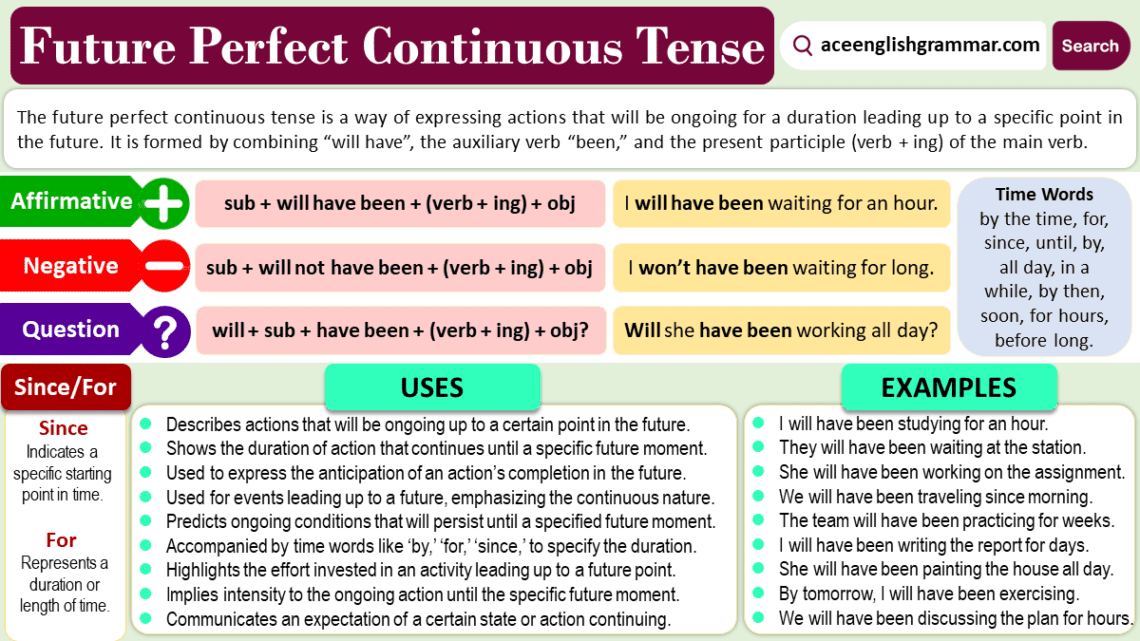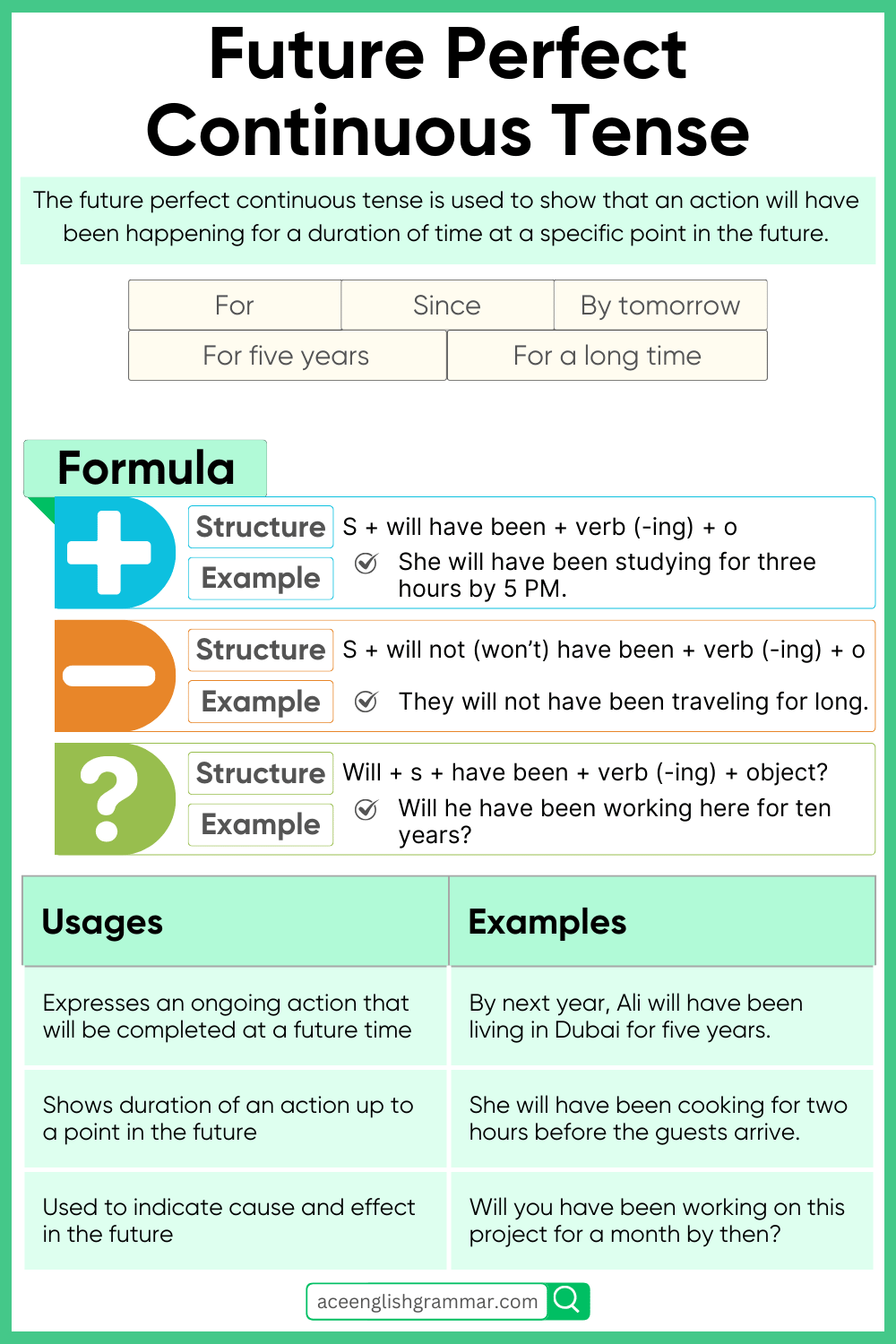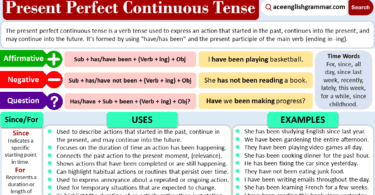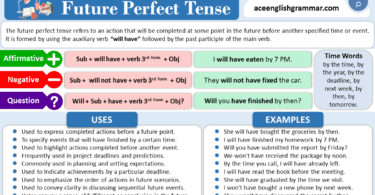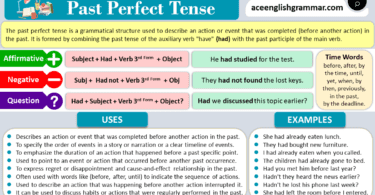The Future Perfect Continuous Tense combines the future perfect and continuous aspects to describe actions that will be ongoing up to a specific future point. This tense is formed using the auxiliary verbs “will have been” followed by the present participle (verb + ing) of the main verb.
Table of Contents
What is the Future Perfect Continuous Tense?
Describes actions that will have been happening continuously up to a certain point in the future. This tense emphasizes both the duration and continuity of the action.
- “By next year, I will have been studying English for five years.”
This sentence means that by a future time, the action of studying will have been ongoing for five years.
Structure of the Future Perfect Continuous Tense
Positive Sentences
Structure:
Subject + will have been + present participle (verb + ing) + object
Examples:
- I will have been working all day.
- She will have been studying for hours.
- They will have been playing football.
Negative Sentences
Structure:
Subject + will not have been + present participle (verb + ing) + object
Examples:
- I will not have been working all day.
- She will not have been studying for hours.
- They will not have been playing football.
Interrogative Sentences (Yes/No Questions)
Structure:
Will + subject + have been + present participle (verb + ing) + object?
Examples:
- Will I have been working all day?
- Will she have been studying for hours?
- Will they have been playing football?
Interrogative Sentences (Wh-Questions)
Structure:
Wh-word + will + subject + have been + present participle (verb + ing) + object?
Examples:
- Why will she have been studying late?
- Where will we have been traveling?
- How long will he have been waiting?
Negative Interrogative Sentences
Structure:
Will + subject + not + have been + present participle (verb + ing) + object?
Examples:
- Will I not have been waiting for a while?
- Will they not have been studying all night?
- Will he not have been living here for a month?
Using “Since” and “For” with Future Perfect Continuous Tense
- Since: Specifies the starting point of the action.
- Example: I will have been studying English since January.
- For: Specifies the duration of the action.
- Example: They will have been working on the project for two hours.
Time Expressions Commonly Used
- By the time
- Since
- For
- By
- Until
- All day
- By tomorrow
- Before long
- In a while
Uses of Future Perfect Continuous Tense
- Ongoing Action into the Future:
Describes actions that will be ongoing up to a specific future point.- Example: By tomorrow, I will have been studying for six hours.
- Emphasizing Duration:
Highlights the duration of an action until a certain point.- Example: By next year, they will have been living in the city for a decade.
- Anticipation of Completion:
Expresses the expectation of an action being completed by a certain time.- Example: By the time you arrive, I will have been working on the project.
- Events Leading Up:
Describes events that will have been happening up to a future occurrence.- Example: By the time the concert starts, the band will have been rehearsing all day.
- Predicting Ongoing States:
Predicts an ongoing state or condition until a future point.- Example: By the end of the week, she will have been practicing yoga for a month.
Examples of Future Perfect Continuous Tense
- I will have been waiting for an hour.
- They will have been studying since morning.
- She will have been practicing the piano for months.
- We will have been working on the project by then.
- He will have been teaching at the school for ten years.
Future Perfect Continuous Tense Chart
| Aspect | Formula | Example |
|---|---|---|
| Affirmative | Subject + will have been + verb (ing) + object | She will have been studying for hours. |
| Negative | Subject + will not have been + verb (ing) + obj | He won’t have been working on the project. |
| Interrogative | Will + subject + have been + verb (ing) + obj? | Will they have been waiting for a long time? |
| Wh-Questions | Wh-word + will + subject + have been + verb + obj? | What will you have been doing before the party? |
| Neg. Interrog. | Will + subject + not + have been + verb (ing) + obj? | Won’t they have been studying for the exam? |
FAQs
Q1: What is Future Perfect Continuous Tense?
It is used to describe an action that will be ongoing up to a specific point in the future.
Q2: How is Future Perfect Continuous Tense formed?
The structure includes “will have been” followed by the present participle (verb + ing).
Q3: When do we use Future Perfect Continuous Tense?
It is used to emphasize the duration and continuity of an action up to a specific future time.
Q4: How do “since” and “for” work in this tense?
Use “since” to indicate the starting point, and “for” to express the duration of an ongoing action.
Q5: Can you provide examples of future perfect continuous tense?
- I will have been studying for an hour.
- They will have been waiting at the station.
You May Also Like:

